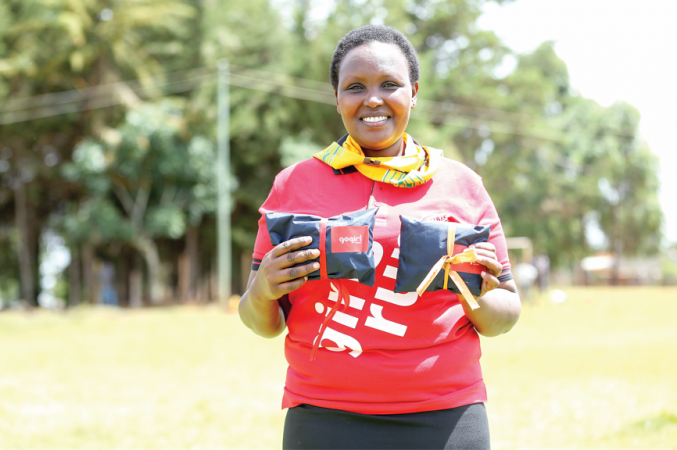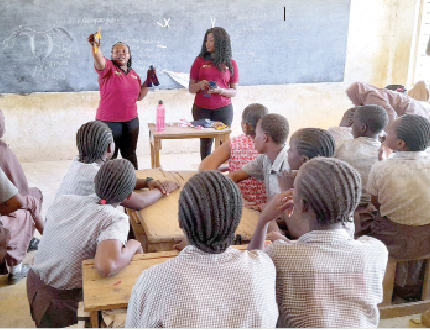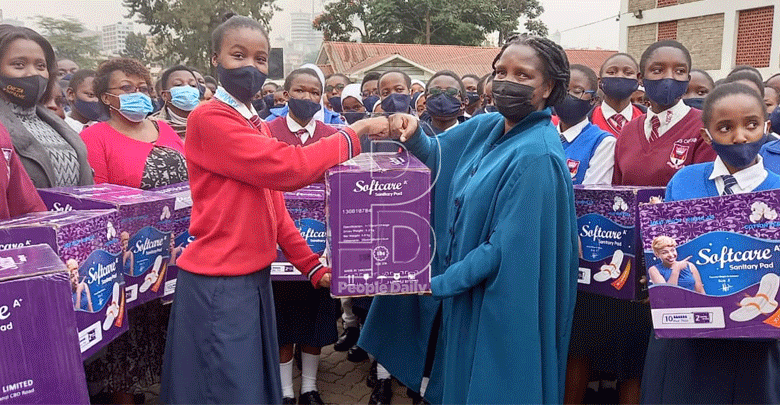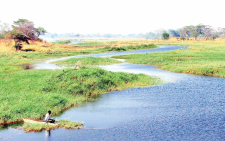Helping girls tackle menses shame

Menstrual hygiene is something that many may take for granted, but poor women and girls all around the world suffer every month because the cost of having periods is just too high.
In Kenya, a package of sanitary pads costs an average of Sh80. Many poor girls and women are forced to use other available products such as old clothes and mattresses, sand, and twigs among others, which leave them suffering from health problems and social stigma. As a result, girls continue to miss out on school, women continue to miss out on work, and, ultimately, the world continues to miss out because of the economic impact of inequality.
“Growing up, my mother couldn’t afford to buy me sanitary pads. I was forced to use old clothes and discarded mattresses when I started menstruating. I came to see and use some of these products when I joined the secondary school since they were listed as compulsory when reporting to school,” says Milcah Cherotich a woman who is driving the fight to ensure that women and girls in Kenya can with the help of simple menstrual products, reach their full potential.
Today, Cherotich, director and founder of Women Development Centre (East Africa) Ltd (Wodec) organisation supports women and girls by providing them with menstrual hygiene supplies at an affordable fee. Wodec is a women-led social enterprise company that has firmly positioned itself to engage in development and work to make quality sustainable feminine hygiene kits. The organisation specialises in the production of washable re-useable pads to improve menstrual hygiene for vulnerable girls and women in Kenya.
Unlike other pads, her napkins are easily biodegradable, since together with her sewing team of four, they use materials that are environmentally friendly from Rivatex and other sources. These durable and long-lasting pads come as a kit and each kit consists of two waterproof shields, four heavy liners, a small bag to carry the soiled liners, and a pantie. The kits can last for up to three years, can be washed with little water, and fold out to look like handkerchiefs when drying. Each kit goes for Sh600.
Issue of concern
“Wodec’s re-usable sanitary pads are environmentally friendly. Unlike the conventional products, which are either sent to landfills or go through the sewage system and end up polluting the ocean and beaches, these products never end up in the refuse and therefore do not pollute the environment,” she shares.
Cherotich decided to focus on Menstrual Hygiene Management (MHM) because it is an issue that has been identified by disadvantaged women and girls as a driver of gender inequality and disempowerment in slum areas.
To ensure that her products get to reach as many girls and women as possible, recently she joined hands with Kenya Community Sports Foundation (Kesofo) to launch an initiative in Iten that seeks to raise funds for girls from poor areas to access sanitary pads in addition to raising awareness on the prevalence of period poverty.
Dubbed the GirlsRun Marathon, the initiative, which will be sponsored by Rubis Energy Kenya will see various international and local athletes October this year congregate in Iten, Elgeyo Marakwet county for a marathon to promote menstrual hygiene among school-going girls in poverty-stricken areas.
“The initiative seeks to support our MHM programme. Through this initiative, we will be able to raise funds that will be used to produce about one million reusable sanitary towels kits, which will then be given out for free to school going children not only in Iten, but also in other areas such as Kapsabet, Kabarnet, Kilifi, and Narok for the next one year,” she revealed.
She says the idea of having such an initiative was borne after realising that even after introducing reusable kits to the Kenyan market, very few people could afford to buy them. The reason is, that significant barriers to high-quality menstrual hygiene management (MHM) persist across Kenya and remain a particular challenge for low-income women and girls.
Research by FSG, a mission-driven consulting firm supporting leaders in creating large-scale, lasting social change funded by Bill and Melinda Gates Foundation shows that girls continue to face monthly challenges, with 65 per cent of women and girls in Kenya unable to afford sanitary pads. Only 50 per cent of girls openly discuss menstruation at home. Another report by United Nations Educational, Scientific and Cultural Organization (Unesco) also shows that Monthly periods cause one in every 10 girls to miss five per cent of school every month, posing a threat to their performance and overall success.
Overcoming barriers
Other barriers include; just 32 per cent of rural schools have a private place for girls to change their menstrual products and only 12 per cent of girls in Kenya are comfortable receiving information from their mothers. Other studies have shown that two out of three pad users in rural Kenya receive them from sexual partners and one in four girls do not associate menstruation with pregnancy.
“With this initiative, we will be able to support girls’ stay in school and reach their potential. So far, we continue to host sessions on MHM as well as produce and distribute washable sanitary pads to the hard-to-reach girl populations in Kenya. This sports event will help us preach the gospel of overcoming ‘period shame’ by providing vulnerable girls with sanitary towels and information about menstrual management. We will also use the event as an avenue to raise awareness on key issues affecting our communities,” she adds
She says every girl and woman in Kenya deserves access to safe and hygienic-sanitary products because such products will help them reclaim the dignity that poverty denies them and enable them to make a lasting and positive impact on the communities they live in society as a whole.









